|
|
|
Sort Order |
|
|
|
Items / Page
|
|
|
|
|
|
|
| Srl | Item |
| 1 |
ID:
121669
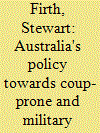

|
|
|
|
|
| Publication |
2013.
|
| Summary/Abstract |
Events in Thailand, Fiji and Burma in 2006 and 2007 focused attention on Australia's foreign policy response to regional coup-prone states and military regimes. Australia's official reaction to these events took different forms: for Thailand, a mild rebuke that brought no change in Thai-Australian relations; for Fiji, condemnation, the imposition of sanctions and a call for the people of Fiji to rebel; and for Burma, a change of policy that brought financial sanctions against the military regime. This article argues that, in responding to these regimes in different ways, Australian governments act on the basis of differing prisms of understanding through which they assess regions and states. The differences ultimately arise from calculations of Australian national security, strategic interests, alliance maintenance and power potential, but tend to be obscured by the universalist rhetoric of promoting democracy and protecting human rights, to which Australian governments subscribe. As the security dynamic in the Asia-Pacific changes as a consequence of the rise of China, Australian policy towards coup-prone states and military regimes in the region is likely to favour stability over democracy or the protection of human rights.
|
|
|
|
|
|
|
|
|
|
|
|
|
|
|
|
| 2 |
ID:
121663
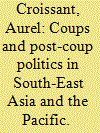

|
|
|
|
|
| Publication |
2013.
|
| Summary/Abstract |
The 2006 coups in Fiji and Thailand-as well as the 2012 incident in Papua New Guinea-have sent timely reminders that military coups remain a threat to vulnerable democracies in South-East Asia and the Pacific. This article explores the interplay between structural factors that can create coup risks, the 'coup-proofing' strategies of political leaders and the occurrence of military coups. While the article examines the region as a whole, it pays particular attention to Myanmar (Burma), Thailand, Indonesia, Fiji and Papua New Guinea. Borrowing from the work of Belkin and Schofer, it argues that the level of coup risk in each country can be assessed by analysing the extent of regime legitimacy, the strength of civil society and the frequency of military coups in the past. By combining this analysis with an evaluation of coup-proofing strategies, the study discusses likely scenarios for the five focus countries as far as the likelihood of coups or, alternatively, the establishment of stable civilian control is concerned.
|
|
|
|
|
|
|
|
|
|
|
|
|
|
|
|
| 3 |
ID:
121662
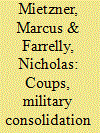

|
|
|
| 4 |
ID:
121666


|
|
|
|
|
| Publication |
2013.
|
| Summary/Abstract |
After five decades in which military dominance defined post-colonial politics, Burma has recently embarked on a long-delayed process of political reform. The gradual democratisation of the country's political institutions has meant that the history of its two twentieth-century coups is increasingly overlooked. This article presents a focused study of military interventionism in Burma and offers explanations for the successful entrenchment of military rule. The mindset of the military leadership and its success at sidelining opponents is explored alongside a preliminary consideration of the role that international support has played. Crucially, military leaders have been exasperated by what they consider feeble (and foreign-controlled) civilian authorities that have been incapable of preventing national fragmentation. This mindset, plus effective repression and support by neighbouring countries such as China, formed the basis of the military's rule. Therefore, the prospects of future democratisation efforts will rely on a fuller understanding of the processes that led the armed forces to exert consistent dominance.
|
|
|
|
|
|
|
|
|
|
|
|
|
|
|
|
| 5 |
ID:
121668
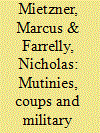

|
|
|
|
|
| Publication |
2013.
|
| Summary/Abstract |
Scholars of civil-military relations have long been puzzled by the fact that despite a series of mutinies, Papua New Guinea (PNG) has never seen a full-blown military takeover. Indeed, when PNG became independent in the early 1970s, some veteran PNG watchers had predicted that the country was likely to follow in the footsteps of many coup-prone African countries. In this article, the authors highlight the reasons for the surprising absence of coups in PNG by comparing the country to three South-East Asian nations that have experienced coups. By contrasting PNG with Indonesia, Burma and Thailand, the authors identify five key factors that have prevented coups in the former and facilitated them in the latter: first, the role that the military played in the struggle for independence or modern statehood; second, the size of the armed forces; third, the military's organisational capacity; fourth, geographical conditions and the military's command structure; and finally, the general relationship between civilian and military elites.
|
|
|
|
|
|
|
|
|
|
|
|
|
|
|
|
| 6 |
ID:
121667
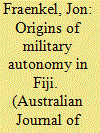

|
|
|
|
|
| Publication |
2013.
|
| Summary/Abstract |
Alongside Thailand and Pakistan, Fiji has gained a reputation as the most coup-prone state in the Asia-Pacific region. Following a succession of coups, Fiji's military eventually established a longer-term authoritarian administration, inviting comparisons with Burma and Indonesia under Suharto, where military rulers also saw themselves as playing an overarching guardian role transcending ethnic cleavages. Yet, unlike Burma and Indonesia, Fiji's military has no heroic history of involvement in a national liberation struggle and faces no serious threat to territorial integrity. This article examines the dynamics of Fiji's three coups and the accompanying shifts in military orientation. During the initial coups, the military served principally as an instrument of the country's ethnic Fijian chiefly elite. Since the third coup, in December 2006, it has not only confronted key institutions of Fijian power, including the Great Council of Chiefs and the Methodist Church, but also dismantled core bases of Fiji Indian politics, including sugar cane farmers' organisations and municipal councils. International focus on the electoral timetable has distracted attention from these deeper-seated changes. Fiji has reached the end of a long era of bicommunal ethnic politics, with schisms amongst indigenous Fijian factions likely to dominate the country's politics in the future.
|
|
|
|
|
|
|
|
|
|
|
|
|
|
|
|
| 7 |
ID:
121665
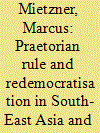

|
|
|
|
|
| Publication |
2013.
|
| Summary/Abstract |
Indonesia is an almost ideal case study to test a variety of explanatory propositions for the rise and fall of military regimes. Over the course of 50 years, Indonesia has witnessed a military takeover, the consolidation of praetorian rule, the toppling of a military-backed autocrat and the marginalisation of the armed forces from politics after democracy took hold. The analysis of these four periods delivers important insights into the conditions under which countries fall victim to military coups and subsequently fail or succeed in their efforts of redemocratisation. While historical, governmental, economic, international and military-internal factors are all at play, it is arguably the quality of civilian governance that has the greatest impact on a state's prospects of preventing military interventionism. In turn, the strength of civilian governments depends to a large extent on the existence of a solid democratic consensus against military rule; as the Indonesian case shows, the absence of such intra-civilian agreements delivers ample opportunities to military officers to meddle in political affairs.
|
|
|
|
|
|
|
|
|
|
|
|
|
|
|
|
| 8 |
ID:
121664
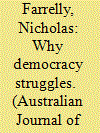

|
|
|
|
|
| Publication |
2013.
|
| Summary/Abstract |
Since the revolution of 1932 that ended absolute monarchy, Thailand has experienced sporadic military interventions, with 19 coups and coup attempts over those decades. This article explains these military interventions by emphasising the cultural aspects of Thai coup-making at the elite level. Concretely, the article shows that episodic military interventionism-supported by significant and persistent military influence in politics-is now part of a distinctive elite coup culture. In contrast to other so-called 'coup-prone' states, Thailand has largely accommodated military interventionism, especially by accepting the defence of the monarchy as a justification for toppling elected governments. Thailand's reluctance to redemocratise, and the haphazardness of the resulting institutional configurations, suggests that Thailand's elite-and, to some extent, the public as well-have deeply internalised the ultimate acceptability of coups. The test of this arrangement may come with the end of King Bhumibol Adulyadej's reign and the potential realignment of military influence in Thai society.
|
|
|
|
|
|
|
|
|
|
|
|
|
|
|
|
|
|
|
|
|